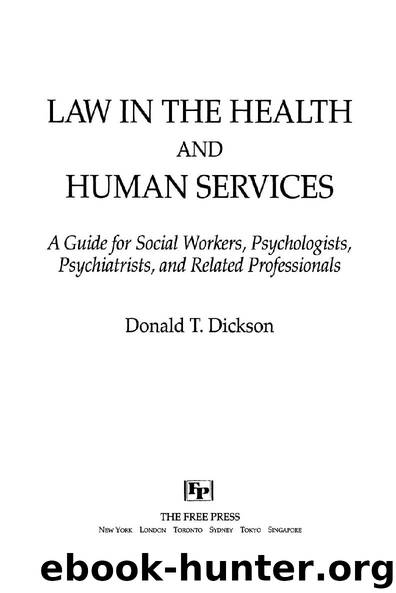Law in the Health and Human Services by Donald T. Dickson

Author:Donald T. Dickson
Language: eng
Format: epub
Publisher: The Free Press
Notes and Issues for Discussion
1. Medical choices by parents for children raise difficult issues. In Hofbauer, the choice was between alternate medical approaches, one traditional, the other nontraditional. The traditional approach, often effective at early stages of Hodgkin’s disease, is accompanied by many documented side effects. Should a protective services agency attempt to balance these? How untraditional can nontraditional treatment be? Important to the Hofbauer decision were the findings that there was professional medical care for Joseph and the parents agreed to use traditional medical treatment if Joseph’s condition warranted it.
2. Christian Scientists believe in faith healing. Jehovah’s Witnesses believe that blood transfusions are forbidden by the Bible and contaminate the body. What happens when the child needs medical care that violates the parent’s religious beliefs? Under what conditions may the state intervene? What rights do the parents have? The child? Often the outcome seems to depend on the court and jurisdiction. One important factor is whether the medical intervention is required to save the child’s life. A number of jurisdictions have approved state action where lifesaving medical procedures are necessary. See, for example, State v. Perricone, 37 N.J. 463 (1962), and People ex rel. Wallace v. Labrenz, 411 I11. 618. Where the intervention is not lifesaving, courts vary. In In re Seiferth, 300 N.Y. 80 (1955), the New York court upheld the parent and child’s decisions not to have invasive surgery; In Matter of Sampson, 29 N.Y. 2d 900 (1972), the same court upheld non-lifesaving medical intervention by the state. See also Guardianship of Philip B., p. 435.
3. Should the court have asked Joseph, age seven, what he wanted? What if Joseph were seventeen? In In re Green, 448 Pa. 338 (1972), the court was asked to appoint a guardian to consent to surgery for Ricky Green, a sixteen-year-old boy who had a severe curvature of the spine. The medical testimony was that with surgery Ricky had a good chance to become am bulatory, but without it he probably would be bedridden for life. Ricky’s mother, a Jehovah’s Witness, objected to surgery on religious grounds. The majority of the Pennsylvania Supreme Court said that if the condition was not life-threatening, the parent’s religious wishes should generally prevail. However, they voted to send the case back to trial to determine the child’s wishes. At the rehearing, Ricky, now seventeen, rejected the surgery and the court concurred. The Pennsylvania Supreme Court upheld this decision. In re Green, 452 Pa. 373 (1973).
Should this decision be left to the child? Can he make an independent choice? The dissent in the original case argued this was an unfair burden on Ricky: “We are herein dealing with a young boy who has been crippled most of his life, consequently, he has been under the direct control and guidance of his parents for that time. To now presume that he could make an independent decision as to what is best for his welfare and health is not reasonable. . . . Moreover, the mandate of this
Download
This site does not store any files on its server. We only index and link to content provided by other sites. Please contact the content providers to delete copyright contents if any and email us, we'll remove relevant links or contents immediately.
The Social Psychology of Inequality by Unknown(3018)
The Plant Paradox by Dr. Steven R. Gundry M.D(2611)
The Writing on the Wall by Anselm Jappe(2039)
Working for Yourself by J.D. (Nolo) Stephen Fishman(1864)
Get What's Yours for Medicare by Philip Moeller(1676)
Every Landlord's Legal Guide by Janet Portman & Stewart Marcia & Ralph Warner(1663)
The First 20 Hours: How to Learn Anything ... Fast by Kaufman Josh(1661)
ADHD on Trial by Michael Gordon(1573)
Decisive by Chip Heath(1561)
Working for Yourself by Stephen Fishman J.D. (Nolo)(1525)
Drafting Contracts: How and Why Lawyers Do What They Do, Second Edition by Stark Tina L(1492)
A Practical Guide to International Arbitration in London by Hilary Heilbron(1434)
The Lord of the Rings: The Fellowship of the Ring, the Two Towers, the Return of the King by J. R. R. Tolkien(1430)
Restitution by Restitution(1424)
The Economist Aug 8th 2015 by The Economist(1421)
Intellectual Property Strategy by John Palfrey(1419)
The Economist Aug 29th 2015 by The Economist(1379)
Collusion by Luke Harding(1314)
Persuasion by Owner(1293)
